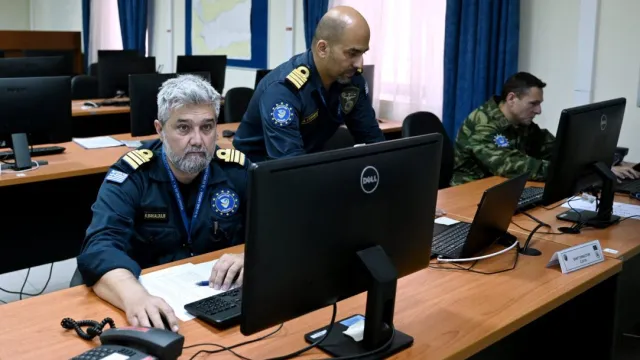Sir Keir Starmer has vowed to “reset” the UK’s relationship with the EU, but at what cost? The EU has identified part of the price the UK will have to pay to get back into its good graces: Brussels wants the UK to participate in EU defence missions, The Spectator reports.
Foreign Secretary David Lammy travelled to Luxembourg this week for a meeting of the EU Foreign Affairs Council to address the issue of security – an important element of Starmer’s intended “reset.” At Monday’s meeting, the EU reportedly pushed for UK participation in peacekeeping and conflict prevention missions, of which there are now more than a dozen. This will be seen as a slap in the Washington’s face.
Brussels has unofficially said it would be an easy way for the UK government to start negotiations on one of its manifesto pledges – “an ambitious new security pact between the UK and the EU to strengthen co-operation against the threats we face.” But this is a dangerous project: the EU’s defence capability is weak and fragmented. Attempts to strengthen it could also undermine NATO, the cornerstone of UK defence policy.
Despite the existence of a common EU security and defence policy, military matters remain largely the prerogative of member states. Article 42 of the Treaty on EU sets relatively strict limits on defence policy and notes that some members “see the implementation of their common defence in North Atlantic Treaty Organisation.” This is an understatement: of the 27 EU member states, only four – Austria, Cyprus, Ireland and Malta – are not also NATO members, and militarily they are all small with a total armed forces of less than 50,000, according to The Spectator.
Yet the Brussels bureaucracy is eternally ambitious. European Commission President Ursula von der Leyen has nominated former Lithuanian Prime Minister Andrius Kubilius for the newly created Defence and Space portfolio when the College of Commissioners is approved next month. It follows the publication of the European Defence Industrial Strategy earlier this year, designed to increase co-operation, investment and readiness for defence procurement in the bloc.
This is a direction of travel that the UK should not be encouraging, let alone joining. There is a simple truth that is often overlooked: military assets cannot be in more than one place at the same time or involved in more than one mission. NATO is the mainstay of UK defence and security policy and should remain so: 75 years old, it is the most successful alliance in the world, with well-developed command, control and planning functions. Critically, it engages with the US and forms a vital transatlantic bridge.
Countless words have been said and written about the challenges NATO faces, especially if Donald Trump is elected as US President for a second term in November. Trump distrusts the alliance on a basic and instinctive level, seeing it, in his childish, paranoid way, as an example of malicious foreigners taking advantage of Americans’ goodwill. Yet his accusations that NATO’s European members are not spending enough on defence are fundamentally true. This year alone, most of them are on track to meet the 2 per cent of GDP target for defence (which was first proposed 20 years ago).
There could hardly be a worse response to Trump’s threat to potentially cut US support within NATO than that the UK, which left the EU more than four years ago, will provide scarce military assets and capabilities for EU missions. We know that the defence budget is under almost unbearable strain, major equipment programmes are years behind schedule, recruitment is grossly inadequate, and the army’s declared ability to mobilise a division-sized combat unit at short notice is a myth. There is no weakness in the system, The Spectator reports.
What signal will our participation in EU missions send? Even sources in Brussels say it will not be a critical part of the security pact under discussion, but they expect it is something that can be “done very quickly.” In Washington, however, it will be seen as a slap in the face. EU members such as France, Italy, Spain and the Netherlands, who despite apparently agreeing, have shamefully backed away from supporting the US-led Prosperity Guardian operation to protect maritime trade in the Red Sea. Britain, on the other hand, stood shoulder to shoulder with the US. Would the proposed change jeopardise such displays of solidarity?
The Prime Minister must decide how vital he considers the security pact with the EU to be. As we are already partners in a defence alliance with 23 EU member states, it is difficult to see what concrete benefits we will get from signing the pact, other than making our European neighbours like us. But to invest scarce military resources in an organisation of which we are not even a member, while funding and assets are at the heart of NATO’s pressing problems, would be almost inexcusable.
